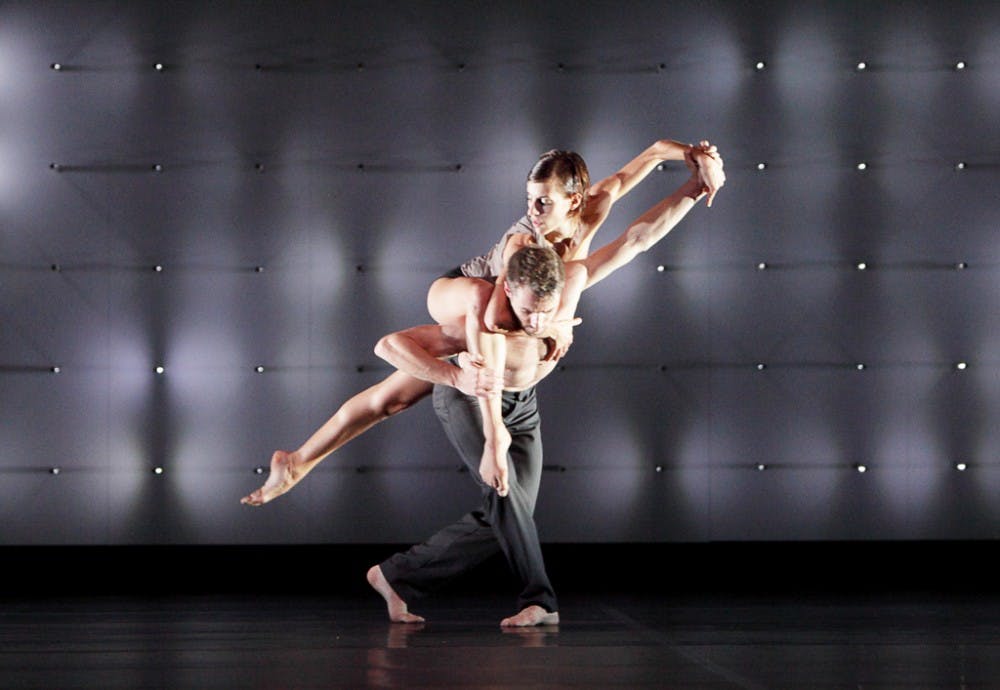This weekend, Random Dance, the London-based dance company and brainchild of award winning choreographer Wayne McGregor, brings its latest production, FAR, to Duke as part of an extended residency.
Inspired by Roy Porter’s book, Flesh in the Age of Reason, FAR explores the role of our cognitive faculties in the creative process, incorporating idiosyncratic choreography and modern technology such as a computerized pin board of 3,200 LED lights and electronic sounds to expand audiences’ notions of modern dance.
Sponsored by Duke Performances, the residency has included class visits and a conversation about Wayne McGregor’s creative process with Antoine Vereecken, rehearsal director for Random Dance, preceding their performances of FAR on February 24 and 25.
Even if you haven’t heard of Wayne McGregor, you’ve probably seen his work. The choreographer behind Radiohead’s music video for “Lotus Flower” and Harry Potter and the Goblet of Fire, McGregor is also the creator of large-scale public dances such as the upcoming Big Dance Trafalgar Square, which will celebrate the London 2012 Olympics in July. McGregor is also Resident Choreographer of The Royal Ballet and a committed educator, conducting workshops and residencies at schools and community centers in the UK and abroad.
“Wayne always says that when he created his company, he didn’t want to be put in a pigeon hole. ‘Random’ meant that he would be able to work on a variety of projects,” said Vereecken, who is managing the tour.
McGregor’s Random Dance productions are heavily influenced by his fellowship with the Experimental Psychology department of Cambridge University, where he studied the cognitive aspects of dance-making. To create FAR, McGregor and a team of neuroscientists asked the dancers to improvise choreography based on prompts such as photographs of medical instruments, imaginary limbs or trios of planets orbiting in space. The scientists would then stop the dancers mid-movement and ask them to write down the last image they were working with, whether visual, auditory or kinesthetic, Vereecken said.
The process helped the dancers understand how they build creative ideas and more effectively channel them into a physical interpretation, said company member Jessica Wright. She added that the personal collaborative process incorporates the dancers’ signature styles and produces an intense physical language.
“Wayne works so closely with the dancers in generating the movement that it’s individual to each one of us,” Wright said. “It’s not something where you sit back and eat your popcorn and enjoy the ride. People are usually quite astonished by the physicality of it. When you see the body moving in a way that’s not recognizable, it’s disturbing somehow, but that’s what makes it fascinating.”
Random Dance’s commitment to education is manifested in its Creative Learning department, which allows children with little or no dance experience to participate in the company’s residency at their school or local community center. The main goal is for children to experience creativity through the medium of dance, but the skill set they learn is much broader, Vereecken said, from making decisions about their own choreography in task-based exercises to working with each other as a group when they make a trio or a quartet.
“We’ll have residencies, and we’ll come in the first day and they’ll say, can we do hip hop?,” Vereecken said. “But over the next couple of days they immerse themselves, and at the end they create a piece that is performed in front of an audience. You can see that they feel that they own the stuff because they co-authored it. It just gives them an amazing feeling. Hopefully it will change something in their perception of life, I suppose.”
The residency is particularly significant for the dance community in the Triangle area, which encompasses dance programs at Duke as well as the American Dance Festival, which Duke hosts during the summer, said Director of Duke Performances Aaron Greenwald.
“There is a sophisticated and experienced dance community in Durham, and we feel like it’s entertaining and serves our campus and community well to be a presenter of forward-looking art, whether that’s theater or dance or music, and to connect those performances with the community in which we live and the campus on which we work,” Greenwald said.
Tyler Walters, associate professor of the practice of dance, agrees that Random Dance’s conversation and class visits are a valuable experience for his dance students.
“We get these opportunities occasionally and they almost always bring a lot of energy to the students,” Walters said. “This is the kind of thing students talk about for weeks and months afterward.”
Wayne McGregor | Random Dance and Duke Performances will present FAR this Friday and Saturday at 8p.m. in Reynolds Industries Theater.
Get The Chronicle straight to your inbox
Signup for our weekly newsletter. Cancel at any time.

